On November 22, 2007,  My Brother Fr. Ioanichie (Balan)When he preached in the village church, everyone wept.
My Brother Fr. Ioanichie (Balan)When he preached in the village church, everyone wept.
“>Archimandrite Ioannichie (Balan; 1930–2007), a great Romanian hagiographer, the compiler of the Romanian Patericon, reposed in the Lord. Thanks to him we discovered so many amazing God-pleasers, ascetics and wonderworkers—a whole world of Orthodox sanctity that had been unknown to us before him. Father Ioannichie devoted his entire life to this enormous work, and yet he put his personal monastic labors first, serving Christ at every moment of his life on earth, with every action, word, and movement of his soul. Fr. Ioannichie kept a spiritual diary, and looking into it, we can see how that was possible.
13.XI.1955
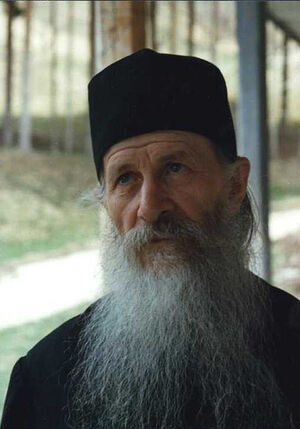 Archimandrite Ioannichie (Balan) I call to you now, my soul, come to speak with me! I call to you, come and awaken from sleep! Come, my soul, so that we can talk, rejoice together and cry! Return from the scattered paths and roads and come so that we can examine our conscience, reject sins and make a good beginning in the service of the Lord Jesus.
Archimandrite Ioannichie (Balan) I call to you now, my soul, come to speak with me! I call to you, come and awaken from sleep! Come, my soul, so that we can talk, rejoice together and cry! Return from the scattered paths and roads and come so that we can examine our conscience, reject sins and make a good beginning in the service of the Lord Jesus.
Thus, seeing that I am so sinful and negligent, I advise you, by the grace of the Lord Jesus Christ, from now on to move forward with a new spirit and new morale; to try most of all to practice spiritual virtues, so that by them we can be vouchsafed the mercy of the Good God in our hour of death.
1) Love. My soul, I have put Divine love first, without which you will die unless you strive to acquire it. Love God as He loves you. Love Him, trusting entirely in His will. Love Him with unceasing prayer, humble obedience, profound humility and penitent crying. Love Him, loving your neighbor; love Him with sacred stillness, love Him with self-denial and self-humiliation.
Remember, my soul, how much the Good God loves you! How much He has done for you, my dear. In addition to His Cross, death, and Resurrection, the Lord raised you from death, enlightened you by Holy Baptism, nurtured you with the milk of the right faith and strengthened you in everything with the dew of the Holy Spirit… What has the Lord not done for you? What has He not given you of what you have asked of Him? What has He ignored when you needed something?
Who kept you alive for twenty-six years? Who comforted you in sorrows? Who strengthened your hope for Paradise? Who visited you when you were sick? Who wiped away your tears? Whose hand has covered you all your life? What Good Samaritan showed you compassion when you were lying, beaten by robbers, on the path of your life? Who put you on His horse? Who brought you to this guesthouse? Who anointed you with oil and bandaged your wounds? Who gave you health, sight, hearing, speech, and mind? Who has been maintaining your life? Only the Good God!
God alone has given you everything and has done everything for you. He kept you in the world for twenty years, preparing something better for you. He took you out of your father’s house, out of the wicked life of this world and brought you to this holy assembly, where you can be saved easily and heal your wounds…
The Good God alone has done everything for you out of love. Therefore, I advise you and solemnly urge you to love the Lord Jesus, God, more. Love Him from the bottom of your soul, love Him with all the strength and zeal of your heart, love Him with all the strength of your mind and thought.
Do whatever you do to be for the glory of God with zeal, and what is not for His glory, don’t do. I advise you to love Him especially with frequent prayer, deep humility and sincere obedience. Do everything for Him alone, try not to upset Him with anything and serve Him with love until you die. And do everything that brings peace to your soul, everything that comforts you in sorrows and everything that strengthens you in life, with joy and hope. When you grieve His holiness, fall down with many tears, fall down in profound humility in prayer, and He will forgive you.
Also, my soul, love your neighbor. Love all people without distinction. Love everyone in Christ and Christ in all humans. Don’t discriminate. Don’t upset anyone with your actions. Don’t offend anyone with your words, and especially in your monastic life, treat your abbot and all the fathers and brethren with love. Love everyone as yourself, serve everyone with love as your parents, and seek peace for everyone!
If they ask you for something, give it to them. If they tell you something, listen to them. If they send you somewhere, go there. If they call you, come. If they persecute you, go away. If they scold you, accept it. If they reproach you, be patient. Be to them as a slave, as a servant to all, and thus you will fulfill the law of Christ’s love. Thus, you will become a good monk and a sincere servant.
Then pray for everyone, forgive everyone, humble yourself before everyone, speak to them meekly, do everything that you see is good for your brother, and don’t do what you see upsets him. Thus, this is what I advise you: to continue on the path of your life with this sacred love for God and your neighbor, for only in this way will you be saved.
2) Obedience. 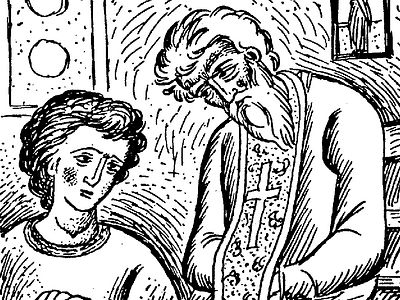 Obedience in the Christian Life According to St. PaulWe tend to view obedience as a burden, but as we see in the Epistles of the great Apostle St. Paul, obedience is a necessary part of the Orthodox Christian life. But why is that?
Obedience in the Christian Life According to St. PaulWe tend to view obedience as a burden, but as we see in the Epistles of the great Apostle St. Paul, obedience is a necessary part of the Orthodox Christian life. But why is that?
“>Obedience is closely connected with love. So, my soul, I advise you to be more obedient, more zealous in this holy service, strive for it with more love, and fulfill it with more humility. Be a good servant to everyone, be a Martha for this community, to everyone and to each one of them individually. Do not resist, do not grumble, but perform all obediences with love. It is your salvation.
It is only by obedience that you will be saved and enter Heaven, your sins will be forgiven, and you will dwell in Paradise. So strive, my soul, to serve everyone, to bring everyone peace and to be a sincere servant of the community of Christ.
The Good God so desired to take you from the world and bring you here. He so desired that you would be saved here, the Mother of God so desired that you would serve Her chosen ones who dwell in this sacred spiritual garden. Do not resist, do not grumble, do not run away, do not feel overburdened, do not lose heart, do not become less zealous, but with renewed and increased strength go to the holy battle for the rest of your life. Do so, and you will be saved by the prayers of your fathers.
3) Prayer. You will not be able to love God unless you pray to Him ceaselessly. You will not be able to obey unless you ask for help from above. You will not be able to cry, to know yourself, to begin a good undertaking and to humble yourself if you do not ask God for everything with holy prayer. Ask, and it shall be given you (Mt. 7:7), the Lord says.
You will not be able to attain salvation unless you live only a life of holy prayer. You will not learn anything, you will not be able to do anything, you will not succeed in growing spiritually at all unless you pray without ceasing.
So, I advise you to be more zealous in prayer. As best you can, as you find it more useful and more peaceful, as you want—just pray all the time: on your way, in towns and villages, at obediences and in your cell, always pray. With your mouth, with your mind, out loud or in secret—always pray. Perform the 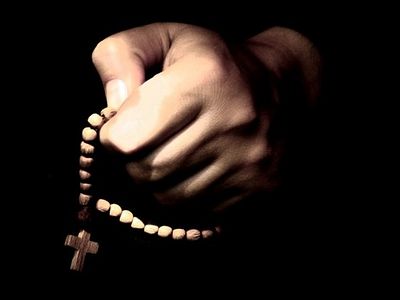 The Jesus Prayer for LaypeopleSome mistakenly think that the Jesus prayer is only for monks. However, the Optina elders also instructed laypeople to do the Jesus prayer.
The Jesus Prayer for LaypeopleSome mistakenly think that the Jesus prayer is only for monks. However, the Optina elders also instructed laypeople to do the Jesus prayer.
“>Jesus Prayer, read the Psalms, read your prayer rule, akathists, prayer services, canons, read what you can and what you want—just pray always and with great humility. Prayer is your nourishment in life, it will strengthen you in everything. It will bring down the dew of God’s mercy and grace into your heart. So, do this, and you will stay alive by prayer.
Do not set yourself limits and laws—I do not force you to walk a more difficult path of prayer, where a lot of diligence and effort is required, because I know that you will not be able to cope with it, but I give you freedom: just pray always and with humility.
Try not to let anyone know about your innermost prayer life. Do not forget that especially by standing attentively in the church and praying you will get a lot of comfort and peace. In addition to the Holy Liturgy, which you should never miss when you are free, stand concentrated at night services and you will gain enormous benefit. Fall with your face down, close your eyes, gather your mind, join your hands, come from the outside into the cell of your heart and stay there as long as you can, persisting in fervent prayer, and thus God will have mercy on you.
Avoid people, friends, meetings, cares and confusion so that you can pray purely and with feeling. Don’t waste time talking or sitting idly. Do not waste the few days that God has given you, but avoid everyone, hide in your cell, in your heart, and pray there with much fervor.
Love secluded, quiet places to learn how to pray better. Kindle a thirst for prayer in yourself, always reading only useful things. Always immerse in yourself and ask in prayer that God will give you the strength to know yourself, that God will give you tears and weeping in prayer, patience in obediences, humility in everything, zeal and the fear of God. Thus, pray always, and God will give you everything useful in this life, and in the life to come He will grant you everlasting bliss in Paradise.
Hurry up, my soul, always be diligent, pray here in this “desert” where God has brought you so that your life here would not be in vain. Love this trinity of virtues: Love, Obedience and Prayer. Love everyone, obey everyone and always pray.
So, rejoice that God has ordained this for you! Where were you six years ago? Where did you wander? Who knew you? Who helped you and what hope did you have? But it’s all gone. Behold, God has had mercy on you. Hurry up, strive, do good in time and not in time. Amen.
15.XI.1955
4) Meekness. How loving and dear to one’s heart is someone who is gentle in word, calm in his actions and reconciled with himself! Therefore, I exhort you, my soul: try to acquire meekness. Strive at any time, in any circumstances and with whomever you meet to show yourself meek, peaceful, quiet, unperturbable and calm. At least forcing yourself, if not from the heart, strive to be meek.
How sweet is a kind word, seasoned with the salt of love, spoken in the spirit of peace, adorned with meekness and charged with the power of wisdom! How much good a troubled and distressed soul gains when it is greeted with a gentle, meek, loving word! How much unity is formed between fathers and brethren when they speak with meekness, when they command with timidity and love! How much love is born where the elders give orders with meekness, gentleness, without getting annoyed, and the younger ones carry out orders with peace and love, with conviction and without grumbling!
And what an invaluable benefit an obedient person receives, living with great prudence at a monastery in peace and harmony with everyone without upsetting anyone in word, without condemning anyone in anything, without judging or quarreling with any of the brethren! Such a person lives in the community as in Paradise and stays in his cell like a king! He doesn’t have a single enemy or ill-wisher in his life. He does not grieve anyone, does not contradict, does not argue, does not wrinkle his forehead like a bull, does not gnash his teeth in rage like a dog and does not wave his hands in anger like a madman. He never raises his voice, does not shout, does not scold anyone, does not resist, does not shame his neighbor, does not worry, does not lose peace of mind because of anything, but remains the same in any circumstances.
Blessed is he who follows Christ in meekness. Follow, my soul, this blessed way of life. You have had enough of all sorts of worldly cares in your life, so strive now to be detached from them in order to always have peace in your soul. Try to remain unperturbed in any event. Try always to speak meekly to your brother, but not with false, crafty meekness; flee from such speech as from snakes. Be sincere at all times. Speak from the heart so that it can go to your neighbor’s heart.
Perform your obedience with meekness, in peace, without confusion, without grumbling. Trust everyone, give sweet advice to those who are in trouble, support those in temptation by deed and word, soothe the pain of the sick with words full of hope. Strengthen the weak with warm words full of exhortations. Always exhort and so you will receive mercy.
5) Sobriety of mind. I will not succeed in anything on the path of salvation unless I have a lively sobriety of mind and heart. There will be no benefit to me from staying here and from my spiritual labors unless I collect my thoughts and purify them, unless I have a sober mind against all bad thoughts and remain in humility of the heart. I also recall the advice and the last word of my reposed father, who had assigned me the same feat before others. So, knowing how great the benefit gained by the soul through this virtue is, I advise you, my soul, to acquire this great feat by diligence and prayer.
Always be sober in mind, control your thoughts, do not let them wander or savor sin; do not allow the arrows of the evil one to penetrate into your heart with evil thoughts, but drive your enemies away with sobriety, thinking above all about death, and by frequent prayer. Put your mind on guard over your heart and always be vigilant so that the arrows of carnal lusts and anger, revenge and all sins cannot penetrate into it.
Pray with attention in your mind and with feeling in your heart; always think about your sins, about your vocation, about the hour of your death and the Last Judgment. Always ask God to help you in this difficult warfare of the mind. Be vigilant, humble, silent and always humble yourself. Avoid completely the worldly glory and honors of this age. Always pray, think about death unceasingly, gather your mind, be sober and stay focused only on yourself—and so you will be given God’s mercy and help.
6) Reading and contemplation. Be nurtured, my soul, by reading sacred books where you will find food for the soul and spring water for your salvation. Especially the Holy Scriptures and the Holy Fathers; always read them and you will find in them the source of life. Then lift up your mind and heart to God. Contemplate on your life, death and the Judgment. Be zealous for this feat, and God will have mercy on you.
7) Stillness. The benefit from  The Path to the Stillness of the Inner HeartWe choose our path here on earth, and often we wander, returning to the drawing board again and again; again we try to break through the thicket of our thoughts, our laziness, our negligence—to the light.
The Path to the Stillness of the Inner HeartWe choose our path here on earth, and often we wander, returning to the drawing board again and again; again we try to break through the thicket of our thoughts, our laziness, our negligence—to the light.
“>stillness is great! Terrible are falls that occur because of the tongue! Especially to you, a monk, silence and self-control of the tongue will be of great benefit. Therefore, I exhort you, my soul: be silent. Say little and only useful things. Don’t talk to women and frivolous people, avoid jokes and laughter, avoid the company of large numbers of people, meetings and friendly conversations. Avoid the silence of the tongue, which stems from ignorance, but be silent with your tongue, with your thoughts, with your eyes and with your feelings. Be watchful, for you will find a great treasure on the earth of your heart, provided you seek it with profound and wise stillness, obedience and prayer. Strive, be silent, flee from everyone, pray, and God will certainly help you.
To be continued…
 My Brother Fr. Ioanichie (Balan)When he preached in the village church, everyone wept.
My Brother Fr. Ioanichie (Balan)When he preached in the village church, everyone wept.
 Obedience in the Christian Life According to St. PaulWe tend to view obedience as a burden, but as we see in the Epistles of the great Apostle St. Paul, obedience is a necessary part of the Orthodox Christian life. But why is that?
Obedience in the Christian Life According to St. PaulWe tend to view obedience as a burden, but as we see in the Epistles of the great Apostle St. Paul, obedience is a necessary part of the Orthodox Christian life. But why is that? The Jesus Prayer for LaypeopleSome mistakenly think that the Jesus prayer is only for monks. However, the Optina elders also instructed laypeople to do the Jesus prayer.
The Jesus Prayer for LaypeopleSome mistakenly think that the Jesus prayer is only for monks. However, the Optina elders also instructed laypeople to do the Jesus prayer. The Path to the Stillness of the Inner HeartWe choose our path here on earth, and often we wander, returning to the drawing board again and again; again we try to break through the thicket of our thoughts, our laziness, our negligence—to the light.
The Path to the Stillness of the Inner HeartWe choose our path here on earth, and often we wander, returning to the drawing board again and again; again we try to break through the thicket of our thoughts, our laziness, our negligence—to the light.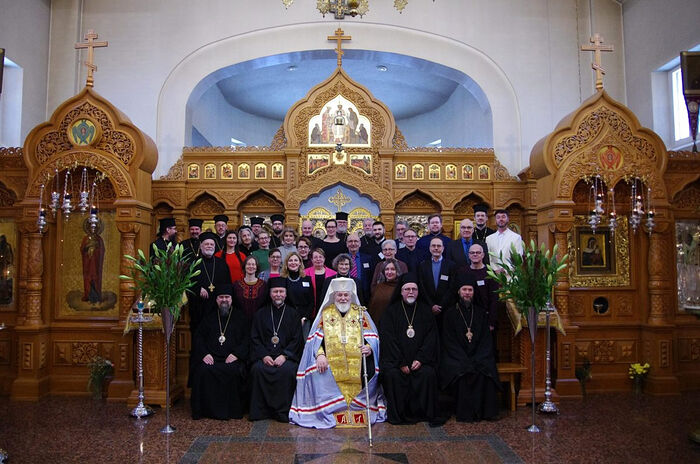
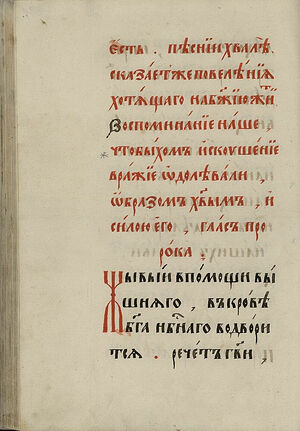
 Elder Ambrose of Optina
Elder Ambrose of Optina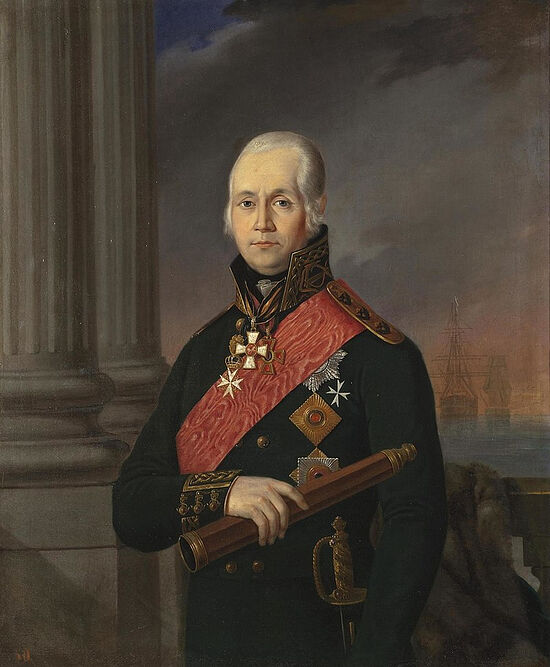
 The Blessed Warrior St. Fyodor UshakovOn August 5th, 2001 at the Monastery erected in honor of the Nativity of the Mother of God in Sanaksar, they glorified the blessed holy warrior Fyodor Ushakov, canonized as a local saint of the Russian Orthodox Church. This was the first appearance of a saint in shoulder-straps—a navy officer—in the Russian church calendar.
The Blessed Warrior St. Fyodor UshakovOn August 5th, 2001 at the Monastery erected in honor of the Nativity of the Mother of God in Sanaksar, they glorified the blessed holy warrior Fyodor Ushakov, canonized as a local saint of the Russian Orthodox Church. This was the first appearance of a saint in shoulder-straps—a navy officer—in the Russian church calendar.
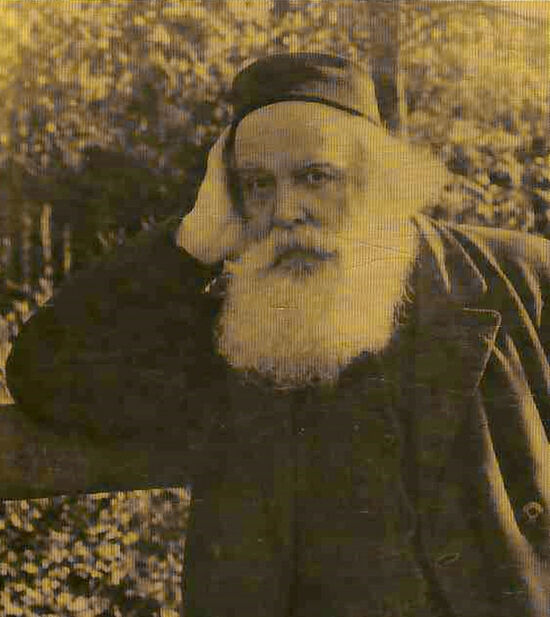
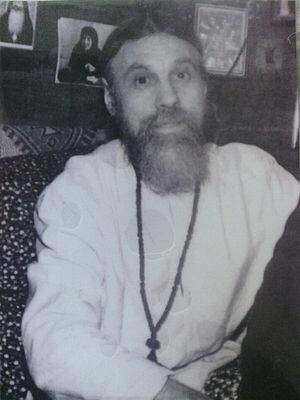
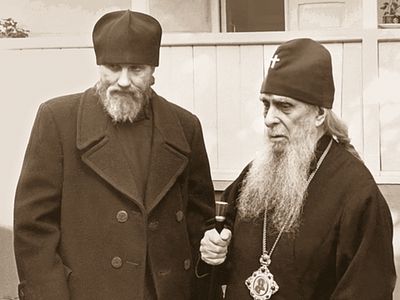 “Love Your Neighbor, and Then You will Begin to Love Christ”His Holiness read the Prayer of Absolution, folded it up and gave it to me to put it in the deceased’s hand. As his thumb moved aside I put the piece of paper in his hand, and his palm closed. By itself!
“Love Your Neighbor, and Then You will Begin to Love Christ”His Holiness read the Prayer of Absolution, folded it up and gave it to me to put it in the deceased’s hand. As his thumb moved aside I put the piece of paper in his hand, and his palm closed. By itself!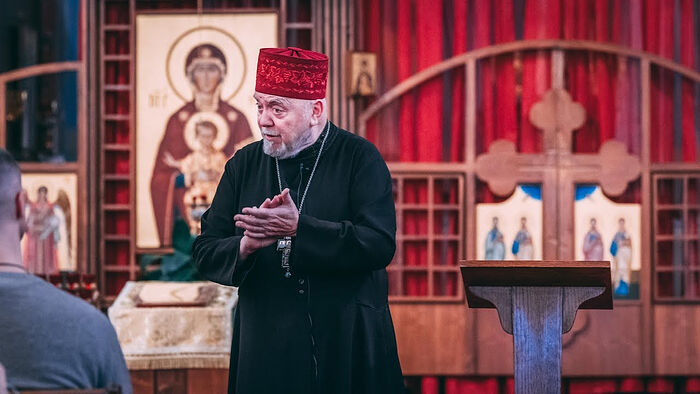
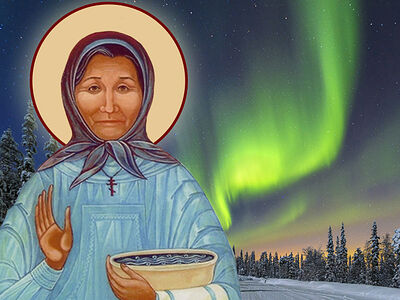 Priests of Alaska discuss canonization of Matushka Olga (+VIDEO)St. Olga is remembered as a humble mother, midwife, and priest’s wife who was filled with love for everybody, and especially abused women.
Priests of Alaska discuss canonization of Matushka Olga (+VIDEO)St. Olga is remembered as a humble mother, midwife, and priest’s wife who was filled with love for everybody, and especially abused women.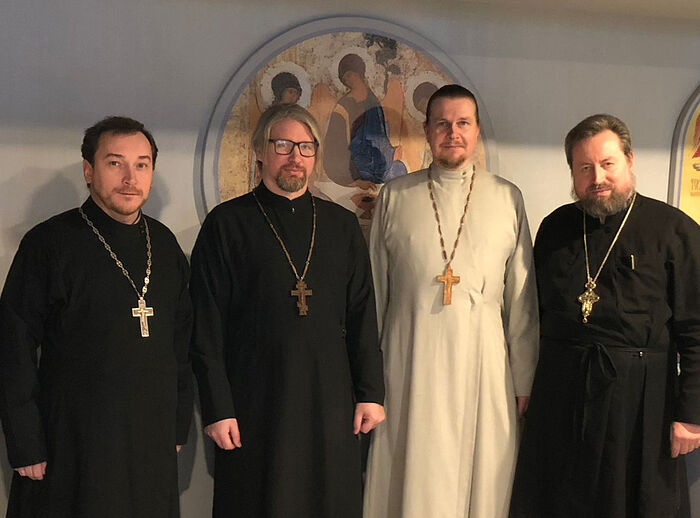
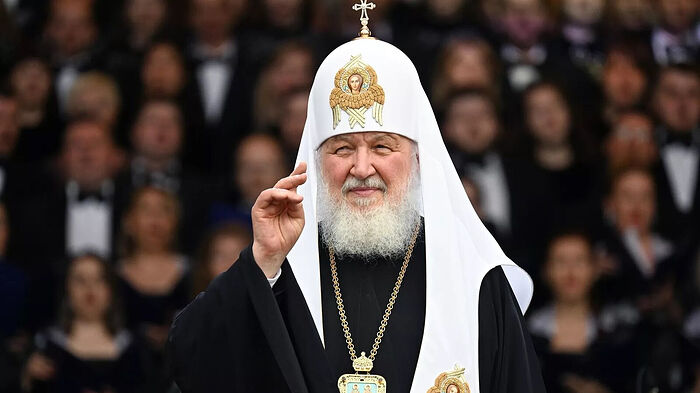
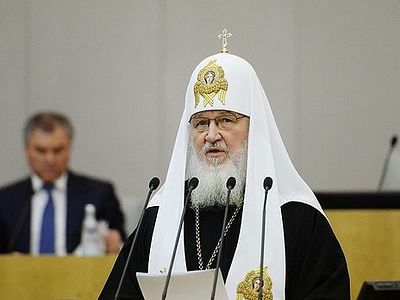 Patriarch Kirill confronts Duma on corruption, abortion“Perhaps one of the most serious temptations of government service on any level is corruption,” the patriarch said, opening 2017’s Nativity Parliamentary Meetings.
Patriarch Kirill confronts Duma on corruption, abortion“Perhaps one of the most serious temptations of government service on any level is corruption,” the patriarch said, opening 2017’s Nativity Parliamentary Meetings. Abortions covered by Russian mandatory medical insurance greatly reduced to cases of rape and imprisoned womenThe accepted reasons for carrying out an abortion within the mandatory medical insurance system in Russia have been greatly reduced, a Church representative had the pleasure of announcing at an international legal forum in St. Petersburg today.”>in 2017, Mother Ksenia (Chernega), abbess of St. Alexis Monastery in Moscow and head of the Moscow Patriarchate’s legal department, was able to announce that abortions covered within the medical system were greatly reduced—to cases of rape and imprisonment.
Abortions covered by Russian mandatory medical insurance greatly reduced to cases of rape and imprisoned womenThe accepted reasons for carrying out an abortion within the mandatory medical insurance system in Russia have been greatly reduced, a Church representative had the pleasure of announcing at an international legal forum in St. Petersburg today.”>in 2017, Mother Ksenia (Chernega), abbess of St. Alexis Monastery in Moscow and head of the Moscow Patriarchate’s legal department, was able to announce that abortions covered within the medical system were greatly reduced—to cases of rape and imprisonment.